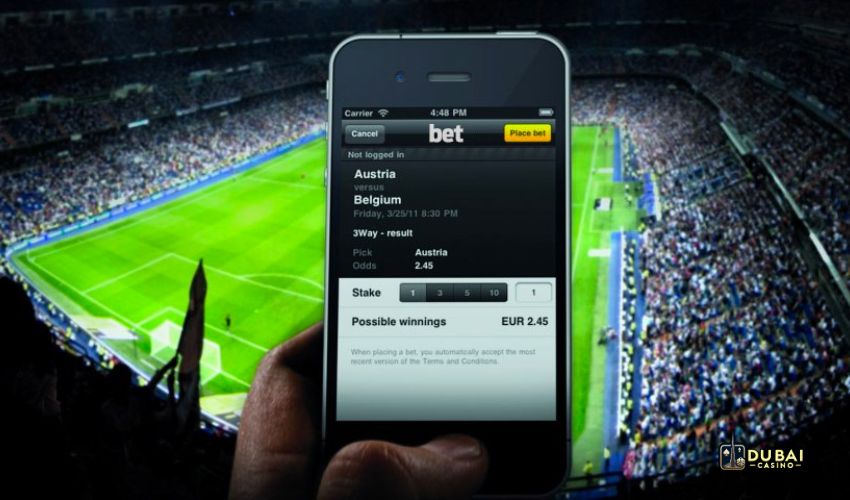How a Parlay Bet Works
A parlay combines multiple wagers, or legs, into one bet. If every single leg wins, the bettor receives a payout that is much higher than what they would have received from placing each bet individually.
The catch is the all-or-nothing condition. If even one leg of the parlay is incorrect, the entire wager is lost. There is no prize for picking three out of four winners. For example, imagine you want to bet on two NFL teams on a Sunday.
- Bet 1: Green Bay Packers moneyline (-150)
- Bet 2: Kansas City Chiefs moneyline (-200)
Instead of placing two separate $10 bets, you could parlay them. If both the Packers and Chiefs win, your parlay wins. If either team loses, your parlay loses.
Understanding Payouts and Profit Margins
Sports Betting sites in Dubai present odds that determine your payout, but these figures do not reflect the true statistical probability of an event occurring. This gap is where the sportsbook creates its advantage, and it is much larger on parlays.
How Sportsbooks Calculate Parlay Payouts
To calculate a parlay payout, sportsbooks combine the odds of each leg. While the exact formula involves converting American odds to decimal odds, the key takeaway is that the potential winnings grow exponentially with each leg you add. A simple two-team parlay might pay a little more than 2-to-1, while a 10-team parlay could offer a payout of over 600-to-1.
“True Odds” vs. Offered Payouts
“True odds” represent the actual mathematical likelihood of an outcome. A coin flip has true odds of +100. A sportsbook, however, might offer you -110 on heads and -110 on tails. That gap is the house advantage, or “vig.” On single bets, this advantage is small. On parlays, this advantage compounds with each leg, creating a massive edge for the house.
Why the House Edge on Parlays Is So High
According to Nevada Gaming revenue reports, this 30%+ house advantage makes parlays significantly more profitable for operators than slot machines (average 6-8% hold) or traditional point spread bets.
How Each Leg Increases Your Payout and Risk
| Parlay Legs | True Odds (Each -110) | Sportsbook Payout | True Win Probability | House Edge |
| 2-team | 2.64 to 1 | 2.60 to 1 | 27.5% | ~4% |
| 3-team | 5.96 to 1 | 6.00 to 1 | 12.5% | ~13% |
| 4-team | 12.28 to 1 | 12.00 to 1 | 6.25% | ~20% |
| 5-team | 24.35 to 1 | 24.00 to 1 | 3.125% | ~25% |
| 6-team | 47.41 to 1 | 47.00 to 1 | 1.56% | ~31% |
Calculation Example: For a 3-team parlay:
- Convert -110 to decimal odds: 1.91
- Multiply all legs: 1.91 × 1.91 × 1.91 = 6.96
- Your $100 bet returns $696, but true mathematical odds should pay $696.40
As you can see, the payout climbs quickly, but your chance of winning a six-team parlay is barely above 1%. Notice how the house edge increases dramatically with each additional leg, reaching over 30% for six-team parlays.
Popular Multi-Bet Variations
Bettors can combine most standard bet types into a parlay. Certain variations have become very popular.
- Cross-Sport Parlays: These wagers combine legs from different sports. For example, you could parlay the winner of a football game with the total points in a basketball game.
- Same-Game Parlays (SGPs): An SGP combines multiple bets from a single contest. A bettor might take a quarterback to throw for over 2.5 touchdowns and for his team to cover the point spread in the same game. SGP odds are calculated differently because the outcomes are often related.
Important Note: SGP odds differ from traditional parlays because outcomes within the same game often correlate. Sportsbooks adjust payouts accordingly, typically offering lower returns than equivalent cross-sport parlays.
- Teasers: This is a specific type of football or basketball parlay. The bettor receives a more favorable point spread on every leg in exchange for a significantly lower overall payout.
Important Rules Every Bettor Should Know
Parlays come with specific rules that can affect the outcome of your wager. Two of the most important are pushes and correlated outcomes.
What Happens When a Bet “Pushes”?
A “push” occurs when a bet results in a tie. For example, if you bet on a team to win by -7 and they win by exactly 7 points, the bet is a push. A push in a parlay does not mean your entire wager loses. Instead, sportsbooks simply remove that leg from the ticket and recalculate the payout based on the remaining legs. A four-leg parlay with one push becomes a three-leg parlay.
Why You Can’t Place a “Correlated Parlay”
A correlated parlay involves two or more legs where one outcome makes the other more likely to happen. Sportsbooks do not allow these wagers because they would eliminate the house advantage. A clear example is trying to parlay a team’s first-half moneyline with their full-game moneyline. If the team is winning at halftime, they are far more likely to win the game. Because these events are directly related, they cannot be parlayed.
Pros and Cons of Parlay Betting
| Pros | Cons |
| Opportunity for a massive payout with a small stake. | Extremely low probability of winning. |
| Adds a high level of excitement to watching games. | Carries a much larger house edge than single bets. |
| Allows bettors to combine several strong opinions. | Not a sustainable or profitable long-term strategy. |
Final Words About Parlay Betting
Treat parlays like a lottery ticket because Nevada data shows parlays maintain a 32.91% house edge, compared to state lottery games at roughly 40-50%. They are an exciting way to chase a huge payout for a small price, but they should not be the foundation of your betting approach.
The most successful sports bettors consistently focus on finding value in single, individual wagers where the house edge is manageable. If you play parlays, keep the stakes small and do it for the entertainment value.




